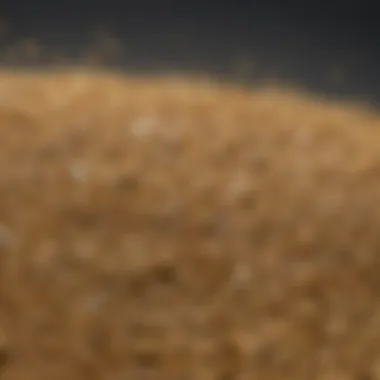Exploring Rye Pollen Extract: Origins and Benefits


Intro
Rye pollen extract has garnered interest for its potential health benefits and uses. Derived from the pollen of rye plants, this extract has been studied for its chemical composition and possible applications in various fields, particularly in natural supplements. With growing awareness of alternative health products, understanding rye pollen extract emerges as relevant for students, researchers, educators, and professionals alike.
Research Overview
Summary of key findings
Rye pollen extract is known to contain a variety of phytochemicals, such as flavonoids and vitamins, that may provide health benefits. Studies indicate that it possesses antioxidant properties, potentially supporting overall wellness. Moreover, researchers have found that rye pollen may contribute to improved respiratory health and enhance immune function.
Importance of the research in its respective field
The exploration of rye pollen extract falls within the broader category of natural supplements. Understanding its health implications informs consumers about available alternatives to synthetic vitamins and supplements. The interplay between traditional knowledge and modern science highlights the significance of such research.
Methodology
Description of the experimental or analytical methods used
Most studies on rye pollen extract employ rigorous methodologies, including chemical analyses and clinical trials. Sophisticated techniques like high-performance liquid chromatography (HPLC) help in determining the extract's chemical profile.
Sampling criteria and data collection techniques
Researchers often obtain samples from various geographic locations to assess the consistency of the extract's composition. Data collection may involve surveying participants who consume rye pollen extract to evaluate health outcomes, thus providing a well-rounded view of its efficacy.
"The meticulous assessment of natural extracts like rye pollen is crucial for establishing their true potential in health applications."
Culmination
The exploration of rye pollen extract as a health supplement paves the way for future research. More studies are needed to quantify its benefits fully and elucidate the mechanisms behind its actions. As availability increases, especially through platforms like Amazon, understanding its implications can greatly empower consumers.
Preamble to Rye Pollen Extract
Rye pollen extract has garnered attention in recent years, particularly within the context of natural health supplements. Of significant relevance, its unique composition and potential health benefits make it a compelling subject of exploration. Understanding rye pollen extract entails examining its origins, historical uses, and implications for modern medicine. This section serves to underscore the foundational aspects of rye pollen extract, which will be pivotal for deeper discussions on its chemical components and health advantages.
Definition and Source
Rye pollen extract is derived from the pollen of the rye plant, Secale cereale. This agrarian genus is predominantly cultivated in Europe and North America, making its pollen readily available from many agricultural sources. The extraction process involves collecting and processing the pollen grains, which are rich in various bioactive compounds. These compounds include proteins, lipids, and carbohydrates, contributing to its nutritional and therapeutic appeal. The specificity of the source is crucial, as it influences the extract's quality and efficacy.
Historical Uses
Historically, rye pollen has been utilized in traditional medicine for its purported health benefits. Many cultures have recognized the properties of pollen as a natural remedy, notably in Europe and Asia. Various folk practices have linked rye pollen to improved vitality, energy, and overall health. Specific traditional applications ranged from digestive health support to enhancements in physical endurance. While modern research is still ongoing, such historical insights offer a valuable context for understanding the evolving perceptions and uses of rye pollen extract today.
Chemical Composition of Rye Pollen Extract
The chemical composition of rye pollen extract is central to understanding its potential applications and health benefits. This section will explore the active compounds and the nutritional profile that characterize rye pollen extract. Understanding these elements is essential for students, researchers, and professionals looking to leverage this natural supplement in various fields.
Active Compounds
Rye pollen extract contains several active compounds that contribute to its therapeutic properties. The main components include flavonoids, fatty acids, and various vitamins. Flavonoids, in particular, are noted for their antioxidant properties. They protect cells from oxidative stress and may lower the risk of chronic diseases. Fatty acids present in rye pollen are primarily polyunsaturated, which are known for their heart-health benefits.
Among the notable active compounds in rye pollen extract:
- Vitamins: Particularly vitamin E and several B vitamins that play various roles in metabolism and maintaining good health.
- Phenolic acids: These compounds exhibit anti-inflammatory effects, which may be helpful in managing conditions like arthritis.
- Saponins: They may contribute to immune function support as well as cholesterol reduction.
These compounds work synergistically, leading to a broad spectrum of health benefits. Notably, their combined actions can enhance overall well-being, emphasizing the importance of chemical composition in rye pollen extract.


Nutritional Profile
The nutritional profile of rye pollen extract provides insights into its overall health benefits and utility as a supplement. This profile highlights not just macro and micronutrients but also their roles in nutrition.
Rye pollen may contain:
- Proteins: Essential for muscle repair and growth.
- Carbohydrates: A primary energy source for the body.
- Minerals: Such as magnesium, potassium, and phosphorus, which are vital for various bodily functions including bone health and heart function.
A typical serving size of rye pollen extract contains a notable concentration of these nutrients, making it a valuable addition to diets. Consumers should consider these aspects when selecting rye pollen extract, as the nutritional quality can vary between different products.
"The composition of rye pollen extract is a critical factor to assess when exploring its potential applications in health and nutrition."
Health Benefits of Rye Pollen Extract
The health benefits of rye pollen extract represent a significant aspect of its appeal as a natural supplement. This section focuses on the unique properties of the extract and its relevance to overall wellness. Understanding these benefits can inform consumption decisions among students, researchers, educators, and other professionals. Throughout this subsection, specific elements such as antioxidant properties, anti-inflammatory effects, and potential hormonal balance will be analyzed.
Antioxidant Properties
Rye pollen extract contains several compounds recognized for their antioxidant capabilities. Antioxidants are crucial in combating oxidative stress, which can lead to cellular damage. Research indicates that rye pollen exhibits a variety of flavonoids. These compounds neutralize free radicals in the body, potentially lowering the risk of chronic diseases.
Additionally, studies suggest that regular consumption of rye pollen extract may improve overall vitality. While more research is needed to establish definitive health claims, the potential benefits are noteworthy. In a lifestyle focused on wellness, incorporating rye pollen can offer a natural source of these vital compounds.
Anti-Inflammatory Effects
The anti-inflammatory properties of rye pollen extract further enhance its profile as a beneficial health supplement. Chronic inflammation is associated with various health disorders, including heart disease and arthritis. Emerging studies indicate that rye pollen may exhibit substances that help modulate inflammatory pathways.
Regular intake of rye pollen could potentially reduce levels of cytokines, which play a significant role in inflammatory responses. With the holistic approach to health becoming more prevalent, exploring natural anti-inflammatory options, such as rye pollen, presents an interesting avenue for further investigation.
Potential Hormonal Balance
Another compelling aspect of rye pollen extract is its potential role in hormonal balance. Some studies suggest that the phytoestrogens found in rye pollen can positively influence hormonal levels, particularly in women during menopause. By mimicking estrogen in the body, these compounds may help alleviate symptoms such as hot flashes and mood swings.
Furthermore, maintaining hormonal equilibrium can lead to numerous health benefits, including enhanced energy levels and improved mental clarity. As the demand for natural solutions grows, rye pollen offers a promising option worth considering for individuals seeking to support their hormonal health.
"Rye pollen extract showcases a variety of health benefits, positioning it as a valuable addition to natural health regimes."
Scientific Research on Rye Pollen Extract
The scientific inquiry into rye pollen extract has gained traction, revealing much about its potential benefits and applications. Recognizing the importance of this extract in health and nutrition is crucial. This section explores recent studies and clinical trials that have provided insights into rye pollen's properties, therefore emphasizing its significance as a natural supplement.
Recent Studies
Recent studies have examined the various biochemical profiles and health benefits associated with rye pollen extract. Researchers have investigated its antioxidant activities, confirming that rye pollen exhibits significant antioxidant properties. This characteristic can help mitigate oxidative stress, which is a contributing factor to many chronic diseases. Furthermore, researchers have focused on identifying the active compounds present in rye pollen.
For instance, studies indicate that flavonoids and phenolic acids, integral to rye pollen's structure, exhibit strong antioxidative effects.
- Key findings from recent studies include:
- Antioxidant activity of rye pollen extract correlates with reduced markers of oxidative stress.
- Presence of beneficial phytochemicals that may aid health.
- Potential role in hormonal balance through modulation of endocrine function.
This evolving body of research is pivotal. It lays the groundwork for further exploration into how rye pollen extract may help in various therapeutic contexts.
Clinical Trials and Findings
In the realm of clinical trials, rye pollen extract has been evaluated for its efficacy in addressing certain health conditions. Several trials focused on the extract's impact on hormonal health, particularly concerning issues related to men's health such as benign prostatic hyperplasia. Findings from these studies suggest that rye pollen can support urinary function and may alleviate discomfort associated with prostate enlargement.
Moreover, clinical research has examined the extract's anti-inflammatory properties. The trials indicated that rye pollen extract could influence inflammatory pathways, leading to potential implications for managing chronic inflammation diseases. This is especially important, given the rising prevalence of such conditions.
"The evidence from clinical studies indicates that rye pollen extract may serve as a complementary approach in managing certain health issues, especially those involving inflammation and hormone regulation."
In summary, scientific research on rye pollen extract is advancing, providing valuable insights into its health benefits. Both recent studies and clinical trials point to its potential utility as a natural supplement. Understanding these findings can guide consumers and professionals in making informed decisions regarding rye pollen extract as part of health management protocols.
Rye Pollen Extract in Everyday Use


Rye pollen extract has gained attention for its potential benefits and practical applications in daily life. As consumers become more health-conscious, understanding how to incorporate rye pollen extract into their routines effectively is increasingly important. This section will delve into recommended dosages and various forms of consumption, providing readers with necessary guidelines and options.
Recommended Dosages
Determining the appropriate dosage of rye pollen extract is a crucial aspect to maximize its benefits while minimizing any possible adverse effects. The suggested dosage often depends on various factors, including individual health status, purpose for use, and the specific product formulation.
- General Recommendations: For healthy adults, an average daily dosage ranges from 500 mg to 1,500 mg. Starting with a lower dose and gradually increasing may be wise to assess tolerance.
- Specific Goals: For those aiming to address specific health concerns, higher doses might be considered, but it is always advisable to consult a healthcare professional before making significant adjustments.
"Finding the right dosage may vary among individuals, stressing the importance of a personalized approach."
Forms of Consumption
Rye pollen extract is available in several forms, allowing consumers to choose what fits their lifestyle best. Each form has its unique characteristics, making some more suitable than others based on dietary preferences or specific health goals.
- Capsules or Tablets: A popular choice due to its convenience. They are easy to swallow and can be taken on the go. This form might be suitable for those who prefer a structured approach to supplementation.
- Powder: Rye pollen extract in powdered form can be mixed into drinks, smoothies, or meals. This versatile option allows for creativity in consumption and can enhance nutrient intake when combined with other ingredients.
- Liquid Extracts: Typically more concentrated than other forms, liquid extracts are absorbed rapidly by the body. They may be the preferred choice for those looking for immediate effects or to customize their dosage more precisely.
- Tea or Infusion: For individuals who appreciate herbal methods, rye pollen can be steeped into tea or used in infusions, blending well with various herbal companions.
Ultimately, understanding each form's characteristics can guide consumers in selecting the one that complements their daily routines and preferences.
Availability of Rye Pollen Extract on Amazon
The presence of rye pollen extract on Amazon represents a significant aspect of its accessibility in the modern marketplace. Amazon is known for its diverse selection and convenience, making it a key platform for consumers looking for health supplements. This section will explore how this availability benefits consumers, along with considerations and factors that they should be aware of when searching for rye pollen extract.
Product Range
When browsing Amazon, customers will find a wide array of rye pollen extract products. Various brands offer different formulations, which may include capsules, powders, and liquid extracts. These products often vary in concentration and purity, allowing consumers to choose what best fits their needs. Here are some examples of the product range:
- Capsules: Easy to take and often standardized for consistent dosage.
- Powders: Can be added to smoothies, yogurts, or beverages, providing versatility in consumption.
- Liquid extracts: These may offer quicker absorption rates for some users.
The variety enables consumers to select products not only based on preference but also on their individual health objectives. Furthermore, consumers can benefit from seeing detailed product descriptions including the sourcing of the rye pollen, extraction methods, and other ingredients used in the formulation.
Consumer Reviews and Ratings
Consumer reviews on Amazon play a pivotal role in informing potential buyers about rye pollen extract products. Often, feedback from previous customers is insightful and can guide decision-making. Reviews typically cover several essential points:
- Effectiveness: Many reviews comment on visible effects such as increased energy or improved wellness after using rye pollen extract. These anecdotal experiences can be helpful to potential buyers.
- Quality: Consumers frequently mention the overall quality in terms of purity and taste. When it comes to dietary supplements, quality is crucial, and reviews can highlight any issues, such as contamination or bitter taste.
- Customer Service: Feedback often includes aspects like shipping speed and seller engagement, which can influence buying decisions.
When reading reviews, buyers should carefully examine both positive and negative comments to gain a balanced perspective. It is also prudent to look for verified purchase badges, as these often signal that the reviews are from genuine customers.
"Rye pollen extract offers a natural supplement option that is both diverse in its forms and available through easily accessible platforms like Amazon. Consumers are encouraged to consider reviews as part of their research."
Regulatory Aspects of Rye Pollen Extract
The regulatory landscape surrounding rye pollen extract is crucial for ensuring the safety, quality, and efficacy of products consumed by the public. Understanding these aspects benefits consumers by providing assurance about the supplements they choose. Regulatory frameworks typically focus on establishing guidelines that manufacturers must adhere to. This includes safety standards and labeling practices designed to inform consumers accurately.
Safety and Quality Standards
Safety and quality standards play a significant role in the regulation of rye pollen extract. Regulatory bodies, such as the Food and Drug Administration (FDA) in the United States, assess the safety of herbal supplements based on scientific evidence. Manufacturers are required to follow Good Manufacturing Practices (GMP), which guarantee that products are consistently produced and controlled according to quality standards. This includes the sourcing of raw materials, ensuring that the rye used for extraction is free from contaminants. Adhering to these standards helps mitigate potential health risks associated with unsafe or poorly manufactured products.
Some specific elements that contribute to the safety and quality of rye pollen extract include:
- Testing for Contaminants: Regular testing for heavy metals, pesticides, and microbial contamination.
- Standardization of Active Ingredients: Ensuring that each batch of extract contains a consistent level of active compounds.
- Traceability: Keeping records that trace the product from its source to the final consumer.
"The integrity of herbal supplements rests on the standards applied during their production. Consumers must be aware of these measures to make informed choices."
Labeling and Claims


Labeling and claims made on rye pollen extract products are pivotal in helping consumers make informed decisions. The regulations dictate that product labels should provide clear information on the contents, dosage instructions, and potential health benefits. Misleading claims can result in legal actions and loss of consumer trust. Therefore, it is essential for manufacturers to present their products with transparency.
Key aspects of labeling regulations include:
- Ingredient Disclosure: Complete listing of all ingredients used in the product.
- Health Claims: Any claims stating health benefits must be substantiated with scientific evidence.
- Serving Sizes: Clear indication of recommended serving sizes to avoid overconsumption.
Potential Risks and Side Effects
Understanding the potential risks and side effects of rye pollen extract is crucial for those considering its use. While rye pollen is often praised for its health benefits, it is not free from possible adverse effects. Being aware of these risks enables users to make informed decisions and to engage in safe consumption practices. This section discusses allergic reactions and interactions with medications, two critical considerations when using rye pollen extract.
Allergic Reactions
Allergic reactions to rye pollen extract can vary significantly among users. Some individuals may experience mild symptoms such as itching or sneezing, while others could face more severe responses like anaphylaxis. Those with known allergies to pollen or grasses are at a higher risk of developing an allergy to rye pollen. Symptoms to watch for include:
- Skin reactions such as rashes or hives
- Respiratory issues, including asthma attacks
- Gastrointestinal disturbances like nausea or diarrhea
It is advisable to perform a patch test before using rye pollen extract extensively. Incorporating a new supplement should always start with small amounts to monitor for any adverse effects. Understanding one's allergies can help mitigate potential risks effectively.
Interactions with Medications
Rye pollen extract may also interact with certain medications, potentially diminishing their effectiveness or leading to unexpected side effects. Some specific interactions to consider include:
- Anticoagulants: Rye pollen might have blood-thinning properties, which can amplify the effects of anticoagulant medications like warfarin.
- Antihypertensive Drugs: There is potential for rye pollen extract to influence blood pressure, which could alter the effectiveness of medications prescribed for hypertension.
- Immunosuppressants: Due to its possible immune-modulating effects, it may interfere with immunosuppressive drugs, affecting their intended action.
Patients taking any of the above medications should consult healthcare professionals before incorporating rye pollen extract into their routines. A thorough discussion can clarify concerns and ultimately ensure safe and effective use.
Rye Pollen Extract in Traditional Medicine
Rye pollen extract has found its place not only in modern dietary supplements but also in traditional medicine practices across various cultures. The exploration of its application in historical contexts presents insights into its significance. People have relied on natural remedies for generations, and rye pollen extract is no exception. The study of its traditional uses can shed light on why it is still regarded as a valuable supplement today.
Cultural Significance
Throughout history, different cultures have utilized rye pollen for various therapeutic purposes. In many Eastern European traditions, rye pollen has been recognized for its healing properties, particularly in the context of male health. It was often viewed as a source of vitality, strength, and fertility. This connection to reproductive health reflects a broader understanding of natural elements in enhancing life quality.
Moreover, rye pollen has been woven into the rituals and customs surrounding agricultural practices, serving as a symbol of harvest and abundance. People believed that consuming products derived from rye could lead to a better harvest. Collectively, these factors underscore the cultural relevance of rye pollen in enhancing community health and well-being.
Traditional Uses
In traditional practices, rye pollen extract has been utilized in various forms. Some of the notable applications include:
- Support for Reproductive Health: Many cultures have attributed benefits like improved libido and enhanced fertility to rye pollen. It is often included in balms or tonics aimed at men’s reproductive health.
- Nutritional Supplement: In regions where rye is a staple, pollen from the plant has been incorporated into the diet for its nutritional benefits. An understanding of its high vitamin and mineral content has led to its use in traditional food preparation.
- Allergy Relief: Some traditional healing approaches include the use of rye pollen as a means to alleviate allergic reactions, particularly seasonal allergies. Individuals would consume rye pollen in small amounts, believing that it could help desensitize the body to allergens.
- General Health Tonic: Rye pollen has also been regarded as a general health tonic, with applications ranging from boosting energy levels to improving overall vitality.
"The intersection of rye pollen extract's cultural roots and traditional uses underscores its importance not only as a supplement but also as a historical element in health practices."
This foundational knowledge serves to enrich our understanding of rye pollen extract and highlights its relevance in contemporary research and application.
Future Directions in Research
Research on rye pollen extract is continuing to evolve, showing promise in various fields. Understanding what lies ahead in this area can be crucial for students, researchers, and professionals seeking deeper knowledge of natural supplements. This discussion focuses on the potential applications and expanding market trends related to rye pollen extract, emphasizing its future implications and opportunities.
Potential Applications
Rye pollen extract is being investigated for its multifaceted applications. One area is in nutraceuticals, where its bioactive compounds could provide health benefits. Research is showing that these compounds may support immune function and metabolic health. Additionally, further studies could reveal roles in preventing chronic diseases.
- Sports Nutrition: As athletes seek natural ways to enhance performance, rye pollen extract may serve as a beneficial agent for stamina and recovery.
- Functional Foods: Integrating rye pollen extract into food products can enhance nutritional profiles, appealing to health-conscious consumers.
- Cosmetics: Due to its antioxidant properties, rye pollen extract might be used in skin care products, promoting skin health and longevity.
Exploring these applications opens doors for innovative products, making it a vital focus area in future research efforts.
Expanding Market Trends
The market for rye pollen extract is witnessing notable growth. As more consumers lean towards natural supplements, demand is rising for products that support health and well-being.
- Sustainability: With increasing awareness about environmental impacts, products derived from natural sources like rye pollen could see enhanced interest. Consumers often prefer sustainably sourced ingredients, impacting purchasing decisions.
- Personalization: As the trend towards personalized nutrition continues, rye pollen extract may become prominent in tailored supplement regimens. Research into individual responses could lead to customized applications and formulations.
- Increased Accessibility: With more retailers and online platforms, including major ones like Amazon, offering rye pollen extract, accessibility is improving. This makes it easier for consumers to incorporate these supplements into their daily regimen.







